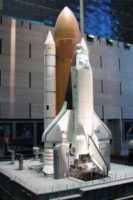22 May First Potential Treatment For Brain Damage From Cosmic Radiation
MedicalResearch.com Interview with:
 Susanna Rosi, PhD
Susanna Rosi, PhD
Director of Neurocognitive Research
Brain and Spinal Injury Center
Professor in the departments of Physical Therapy and Rehabilitation Science and of Neurological Surgery
UCSF
MedicalResearch.com: What is the background for this study? What are the main findings?
Response: NASA and private space companies like SpaceX plan to send humans to the red planet within the next 15 years — but among the major challenges facing future crewed space missions is how to protect astronauts from the dangerous cosmic radiation of deep space.
In this study we identified the first potential treatment for the brain damage caused by exposure to cosmic rays — a treatment can be given after exposure and that prevents memory impairment in mice exposed to simulated space radiation.
MedicalResearch.com: What should clinicians and patients take away from your report?
Response: This study was solely conducted on males however we know that the spacecraft for a deep space mission will be composed of male and female. The question that remains to be answered is if the same effects would be seen in female.
We still need to better understand how microglia activated by space radiation directly affects neuronal functions.
MedicalResearch.com: What recommendations do you have for future research as a result of this study?
Response: We are currently working on groundbreaking follow up studies that we will be able to share more in detail soon.
We are thankful to the NASA for supporting these exciting first studies.
MedicalResearch.com: Thank you for your contribution to the MedicalResearch.com community.
Citation: Karen Krukowski, Xi Feng, Maria Serena Paladini, Austin Chou, Kristen Sacramento, Katherine Grue, Lara-Kirstie Riparip, Tamako Jones, Mary Campbell-Beachler, Gregory Nelson, Susanna Rosi. Temporary microglia-depletion after cosmic radiation modifies phagocytic activity and prevents cognitive deficits. Scientific Reports, 2018; 8 (1) DOI: 10.1038/s41598-018-26039-7
Note: Content is Not intended as medical advice. Please consult your health care provider regarding your specific medical condition and questions.
[wysija_form id=”1″]
Last Updated on May 22, 2018 by Marie Benz MD FAAD
